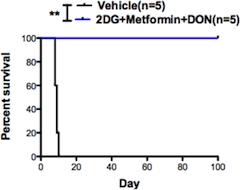Inhibition of T Cell Metabolism Reveals a New Approach to Preventing Graft Rejection
1Department of Liver and Transplantation Surgery, Chang-Gung Memorial Hospital-Linkou Branch, Taoyuan, Taiwan
2Sidney-Kimmel Comprehensive Cancer Center, Johns Hopkins University School of Medicine, Baltimore, MD
3Department of Plastic and Reconstructive Surgery, Johns Hopkins University School of Medicine, Baltimore, MD
4Brain Science Institute, Neurotranslational Program Johns Hopkins University School of Medicine, Baltimore, ND.
Meeting: 2015 American Transplant Congress
Abstract number: D19
Keywords: Graft survival, Immunosuppression, T cells
Session Information
Session Name: Poster Session D: Costimulation and Signaling in Lymphocytes
Session Type: Poster Session
Date: Tuesday, May 5, 2015
Session Time: 5:30pm-6:30pm
 Presentation Time: 5:30pm-6:30pm
Presentation Time: 5:30pm-6:30pm
Location: Exhibit Hall E
Upon antigen recognition and co-stimulation, T cells up-regulate the metabolic machinery necessary to proliferate and sustain effector function. Hallmarks of this response include a switch to aerobic glycolysis and an increased demand for glutamine. This metabolic reprogramming in T cells plays a critical role in regulating T cell activation and differentiation rather than just the result of T cell activation. Based on these observations, we hypothesize that inhibition of glycolysis and glutamine metabolism might represent a novel means of preventing graft rejection. In addition, what has emerged from recent studies is that mechanistically mTOR (mammalian target of rapamycin) regulates T cell differentiation and function in part by regulating metabolic programs including glycolysis and glutamine metabolism. Along these lines, we devised an effective anti-rejection regimen employing a glycolytic inhibitor, 2-Deoxyglucose (2-DG), a glutaminase inhibitor, 6-Diazo-5-oxo-L-norleucine (DON) and an mTOR complex 1 inhibitor, Metformin, in a fully mismatched heart allograft transplantation model. When recipient mice were treated with this anti-metabolic triple therapy, the grafted hearts continued beating for more than 100 days post-transplantation without rejection .Our data suggest that anti-metabolic therapy represents a novel means of inhibiting T cell effector function while preserving mechanisms of immune regulation. The therapeutic index of our approach relies on the extraordinary metabolic demand of effector T cells, which is distinct from the more flexible and adaptive regular metabolic network. Such a regimen can inhibit acute rejection and promote graft survival. 
To cite this abstract in AMA style:
Lee C-F, Lo Y-C, Furtmüller G, Oh B, Andrade-Oliveira V, Thomas A, Brandacher G, Powell J. Inhibition of T Cell Metabolism Reveals a New Approach to Preventing Graft Rejection [abstract]. Am J Transplant. 2015; 15 (suppl 3). https://atcmeetingabstracts.com/abstract/inhibition-of-t-cell-metabolism-reveals-a-new-approach-to-preventing-graft-rejection/. Accessed March 4, 2026.« Back to 2015 American Transplant Congress
